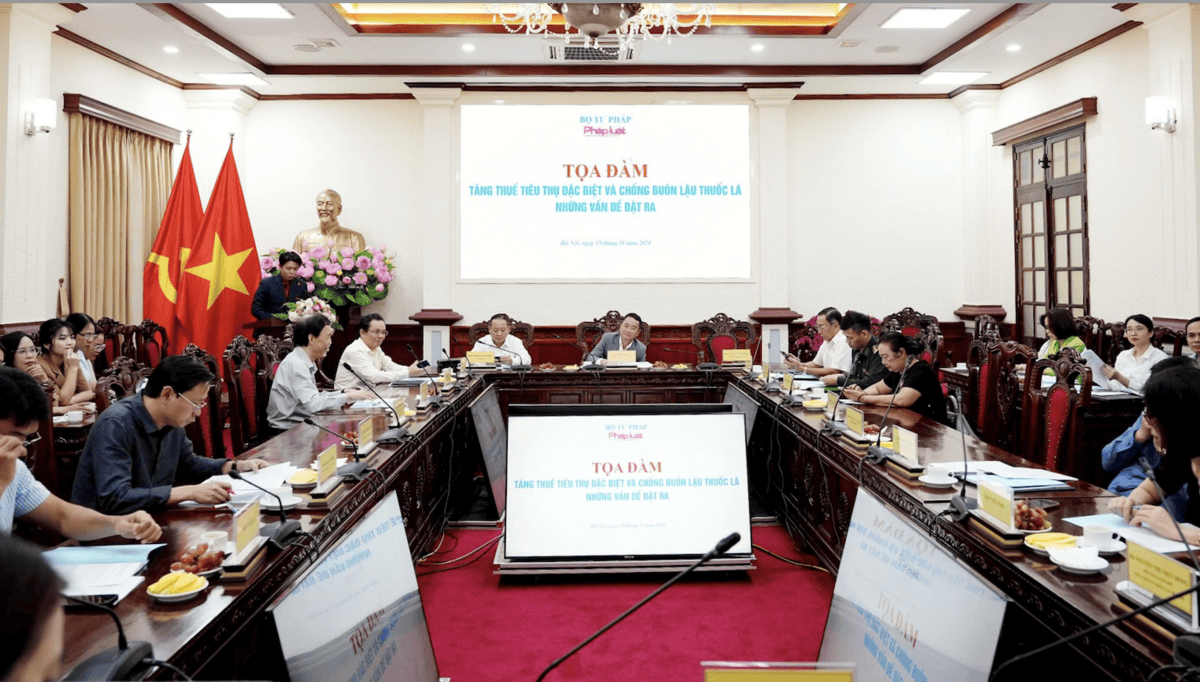
Chair of the Vietnam Tax Consultants’ Association Nguyen Thi Cuc, at a workshop on luxury tax increase and anti-smuggling activities held on November 19, affirmed that raising the luxury tax, or special consumption tax (SCT) as it is called in Vietnam, is a necessity, and should be applied with a mixed approach.
The Ministry of Finance (MOF), which is writing the draft law on SCT, has proposed two options.
Option 1: the current tax rate of 75 percent will be retained, and the flat-rate duty of VND2,000 per pack will be added. In 2027-2030, the flat-rate duty will increase by VND2,000 per pack each year. So, the flat-rate duty will be VND10,000 per pack by 2030.
Option 2: in 2026, when the amended SCT Law takes effect, the total tax to be levied on tobacco products will include the 75 percent tax rate, plus the flat-rate duty of VND5,000 per pack. The duty will increase by VND1,000 per pack per annum before it reaches VND10,000 per pack by 2030.
According to Cuc, the tax increase aims at reducing the number of smokers, especially youth, to protect the health of the community and reduce the risks of contracting dangerous diseases, including lung cancer and respiratory diseases.
However, she warned that the SCT increase may ignite tobacco smuggling. Smuggled products, which don’t bear tax or control in quality, may flood the domestic market. This may reduce the effectiveness of the policy as legal tobacco consumption would decrease, but smuggling would increase.
Smuggled tobacco can avoid all kinds of taxes when imported to Vietnam, including VAT, SCT and import tariff, and other types of tax (in comparison with products legally distributed in the domestic market).
So, the luxury tax increase will have direct impact on legal consumption, while smuggled tobacco won’t be affected. This may lead to a decrease in legal output and pave the way for smuggled tobacco to penetrate the domestic market.
Citing research by many institutions, Cuc pointed out that it is necessary to consider possible scenarios, if SCT increases too rapidly in Vietnam.
Some studies show that in both options above, the total tobacco to be consumed will decrease by 7 percent by 2030. The legal tobacco output in both options will be decreasing sharply by 2030.
The legal tobacco output may decrease by 30 percent in Option 1 (28 billion cigarettes), and 36 percent in Option 2 (31 billion) compared with 2025, before the tax is raised. This will cause big loss to the tobacco manufacturing industry, and enterprises may go bankrupt within a short time once their revenue drops by 32-35 percent.
By contrast, the smuggled tobacco output will rise sharply in both options. By 2030, the smuggled tobacco volume may increase by 205 percent in Option 1 (22 billion cigarettes) and 230 percent in Option 2 (24 billion) compared with 2025.
Cuc believes that Option 1 has more reasonable approach which minimizes possible negative impact on subjects. However, the roadmap for tax increase should be designed in a more reasonable way. It would be better not to raise tax every year, to help the legal tobacco industry have enough time to adapt to new circumstances.
Trang A Duong, a member of the National Assembly’s Ethnic Council, said both options proposed by MOF are too sudden for businesses and therefore would have a negative impact on the tobacco industry.
He went on to say that many factors need to be considered when amending laws, including public health, social security, state budget revenue, business and production stabilization, jobs for workers, and control over smuggled products and illegal production.
Duong pointed out that there is a relation between a tax increase and smuggling increase. In 2016, Vietnam raised the luxury tax rate from 65 percent to 70 percent, and the number of smuggled tobacco destroyed increased from 6.8 million packs in 2016 to 7.5 million in 2017.
In 2019, the tax rate was raised from 70 percent to 75 percent, and the number of smuggled destroyed tobacco increased from 1.4 million packs in 2019 to 5.1 million in 2020 and 6.6 million in 2021.
Duong thinks that it would be better not to raise the tax every year, but once every 2-3 years. This would give the market surveillance force to prepare well to cope with smuggling.
Binh Minh